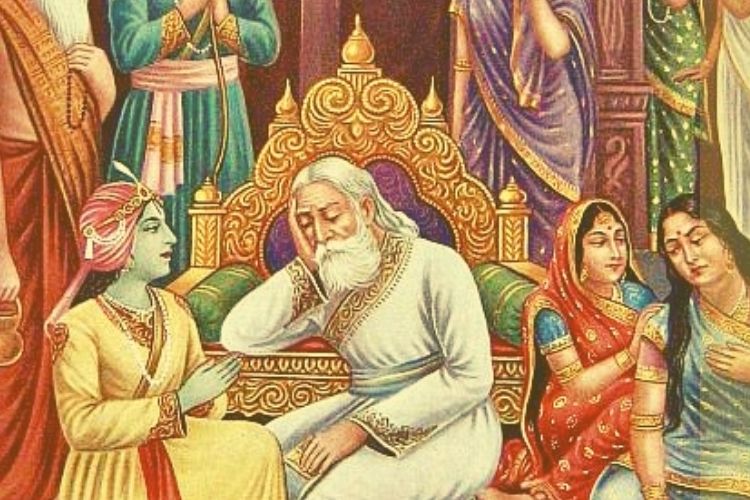In the timeless halls of Kaikeyi’s palace, where the echoes of joy once rang, sorrow now descended like a shroud. The women, their hearts tethered to Rama’s virtue and care, sank into despair. Rama, their protector and guide, who had been the source of their confidence and serenity, had left for the forest. The anguish of separation swelled, for he was their harbor in tempests, their solace in grief. In moments of anger, his words were a balm, and in sorrow, he shared their burdens, leaving them the joy of life’s moments. No difference had he ever shown between them and his mother, Kausalya. Such a soul, unparalleled in grace and affection, was now driven away by the king under Kaikeyi’s sinister influence.
The kingdom of Kosala reflected their despair. King Dasharatha, burdened by the weight of his actions and the malevolence of Kaikeyi’s ambitions, was a shadow of his former self. Ayodhya’s sacred fires dwindled in Brahminical homes; kitchens lay cold and abandoned; the hum of daily life ceased. Elephants and cows roamed restlessly, while newborn mothers found the time inauspicious. The heavens themselves mirrored the kingdom’s turmoil—stars dimmed, planets turned pale, and Visakha, Kosala’s celestial guardian, was cloaked in solar dust. The earth trembled faintly, as if lamenting Rama’s departure, and the oceans raged with thunderous waves. All of nature seemed to pause, stripped of vitality, while fear and uncertainty gripped the hearts of the people.

Amidst this chaos, the royal court lay fractured. Bonds once tightly woven unraveled within hours, leaving the king overwhelmed by grief and guilt. Collapsing to the ground, he lamented his fate. Kausalya and Kaikeyi, seated on either side, sought to revive him, but the sight of Kaikeyi only deepened his pain. “Do not touch me!” he declared in a voice trembling with anguish. “You are no longer my wife nor my kin. You have abandoned dharma for the sake of wealth and power. The sacred bond of marriage, sealed by the holy fire, I now dissolve. The throne, defiled by your ambitions, I disown. Even Bharata, though crowned at your behest, will find his offerings unworthy of my soul.”
Kausalya, ever compassionate, guided the stricken king to her chambers, where his mind roiled with visions of his sons in ascetic garb, departing into the wilderness. Often, his eyes would turn toward the chariot’s path, his thoughts consumed by Rama’s exile. “Rama!” he cried, “I see the footprints of horses but not your face. You, who once slept on beds adorned with silk, now lie upon the bare earth beneath trees. Sita, unaccustomed to hardship, walks upon thorns and fears the roars of beasts. Kaikeyi has torn away the happiness of all my wives, and my house feels like a withered garden, a pond drained of its water.”
The palace, like the kingdom, seemed lifeless. Kausalya, her hands trembling, placed them gently on the king, her silent prayers to Vishnu for his recovery carrying a flicker of hope. Yet, even as she prayed, her heart knew the divine purpose behind Rama’s exile. It was a design of higher intent, beyond mortal understanding, and her prayers, though earnest, might pale before the will of the Creator.
As night deepened, Dasharatha’s cries for Rama grew weaker, his breath faltering. “O Rama,” he murmured, “those who live for fourteen years shall see you again. But I will not be among them.” Darkness spread through the halls, punctuated by sighs and muffled sobs. Kausalya, fearing for her husband’s life, remained by his side, her devotion unwavering, her hope fragile, awaiting the answer to her prayers in the face of fate’s inexorable tide.





